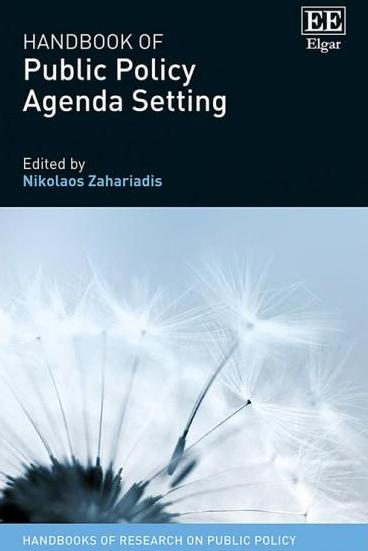1. Setting the Agenda on Agenda Setting: Definitions, Concepts, and Controversies, Nikolaos Zahariadis
Part I. People and Context
2. A Radical Idea Tamed: The Work of Roger Cobb and Charles Elder, Bryan D. Jones
3. Agenda Setting, Problem Definition, and their Contributions to a Political Policy Analysis, David A. Rochefort
4. John Kingdon and the Evolutionary Approach to Public Policy and Agenda Setting, Frank R. Baumgartner
Part II. Theoretical Developments
5. Punctuated Equilibrium Theory, Christoffer Green-Pedersen and Sebastiaan Princen
6. Multiple Streams Analysis: A Flexible Metaphor Presents an Opportunity to Operationalize Agenda Setting Processes, Paul Cairney and Nikolaos Zahariadis
7. Making Sense of Complexity: The NPF and Agenda Setting, Holly L. Peterson and Michael D. Jones
8. Constructivism and Agenda Setting, Sabine Saurugger
Part III. Institutional Dimensions
9. Political Agenda Setting by the Mass Media, Peter Van Aelst and Stefaan Walgrave
10. Policy Entrepreneurship and Agenda Setting, Nissim Cohen
11. Interest Groups and Agenda Setting, Laura Chaqués-Bonafont
12. Political Parties and the Policy Agenda, Vilém Novotný, Martin Polášek, and Michel Perottino
13. Presidential Power and Agenda Setting, Paul Rutledge
14. The Domestication of a “Wild” Problem: Taming Policy Agenda Setting, Philippe Zittoun
15. Knowledge, Epistemic Communities, and Agenda Setting, Claire A. Dunlop
Part IV. Comparative Applications across Levels of Government
16. Local Government Agenda Setting, Rebecca Eissler, Peter B. Mortensen, Annelise Russell
17. Agenda Setting Dynamics and Differences across Issues: Agenda Setting on the Economy and Foreign Policy, Jeffrey S. Peake
18. Communications Policy in the EU: The UK as a Policy Entrepreneur, Alison Harcourt
19. Agenda Setting in the European Union: From Sui Generis to Mainstream, Sebastiaan Princen
20. The United Nations and Agenda Setting, Jutta Joachim and Natalia Dalmer
Part V. Agendas and Crises
21. Attention and Natural Disasters, Thomas A. Birkland
22. Institutional Crisis and the Policy Agenda, Chris Ansell, Arjen Boin, and Sanneke Kuipers
23. Financial Regulation and Agenda Dynamics: Impacts of the Global Financial Crisis, Roy Gava
24. Problem Definition and the Social Dimensions of Crises, Stella Ladi





